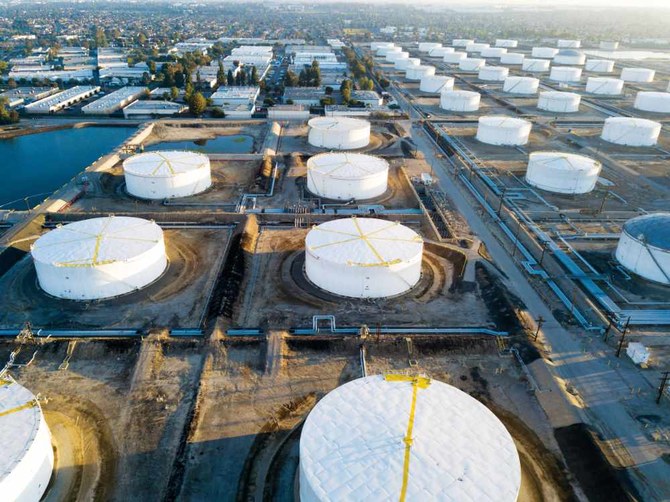LONDON: Oil prices were steady on Thursday after hitting fresh 11-month highs on a fall in US stockpiles and in the wake of a pledge by Saudi Arabia to cut output by more than expected.
Brent crude was up 5 cents to $54.35 a barrel at London afternoon trade after touching $54.90, a fresh high not seen since before the first COVID-19 lockdowns in the West.
US West Texas Intermediate (WTI) was up 26 cents, or 0.5 percent to $50.89 after touching $51.28.
Wednesday’s storming of the US Capitol by supporters of US President Donald Trump appeared to have little impact, while a slight rise in global equities suggested investors believed President-elect Joe Biden would be empowered to spend more freely.
Oil prices have been supported this week by a pledge by Saudi Arabia to cut output by an additional 1 million barrels per day (bpd) in February and March.
“Saudi Arabia ... intimately knows the relationship between the oil price and the global inventory levels. Lower inventories equal higher prices,” SEB chief commodity analyst Bjarne Schieldrop said.
BACKGROUND
$63 - UBS expects Brent to trade at $63 per barrel in the second half of 2021 and WTI to trade at a $3 per barrel discount to Brent prices.
“The strategy of course only works if the OPEC+ (group of oil producers) stays disciplined,” he added. UBS analysts raised their forecast for Brent to $60 per barrel by mid-year, citing the Saudi output decision.
“The Kingdom’s preemptive move suggests to us a desire to defend prices and support the oil market amid demand concerns due to extended mobility restrictions in Europe,” they said.
US crude stocks fell and fuel inventories rose, the Energy Information Administration said on Wednesday.
Crude inventories were down by 8 million barrels in the week to Jan. 1 to 485.5 million barrels, against a Reuters poll showing analysts expected a 2.1 million barrel fall.
The drop in crude stocks is a typical year-end occurrence as energy companies take oil out of storage to avoid tax bills.
UBS raised its Brent forecast amid expectations of a sharp recovery in demand in the second quarter on vaccine rollouts and increased travel.
With Saudi Arabia’s move, OPEC’s production increase of 0.5 million barrels per day (bpd) for January is reversed in full, which will result in a tighter oil market in the first half of the year, analysts at the Swiss bank wrote in a note.
The bank expects Brent to trade at $63 per barrel in the second half of 2021 and WTI to trade at a $3 per barrel discount to Brent prices.




























